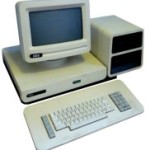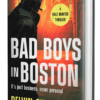The History of Computers as I know it
That was a surprise. The seventy year-old coaching two thirty-somethings on Internet marketing. I thought they knew this stuff.
Not a strategy meeting, a how-to-use-the-tools meeting. SEO, AdWords, pay-per-click, Google analytics, automated email services.
Social media marketing. Facebook, LinkedIn, Twitter.
Not chatting, selling!
They’re engineers too. I thought they knew this stuff. But they’re fascinated by precise details of products and processes, not the inexact sciences of management and marketing.
And they just bought the company. Oh, dear.
“You engineers put everything into a spread sheet.” It worked for me. I learned faith in numbers, and the value of analysis. And that neglecting management & marketing is a formula for failure.
More coaching is required. These young people take technology for granted. Texting, mobile apps, share it on Snap Chat, look it up on Google, wireless Internet everywhere.
Devices always on, interrupting everything.
When I was their age, …. New technology was fuzzy black & white going to flashy bright colors on our home television sets. Writing and calculating were done with pen and paper. Ball point was a new technology.
“Look it up” meant a trip to the library. It was the 50’s. We played outside. Computers were only used by the military. IBM was a typewriter company. And I graduated from engineering with a slide rule. (You can Google it.) Introduced to computers through a glass window behind the data entry counter. Flashing red and green lights, spinning tape reels. Don’t drop that deck of key-punch cards!
MBA School allowed electronic calculators. Not in exams, that would be cheating. Computing on the job meant a terminal and a bleeping modem in the office connected to magical mainframe UNIVAC 1108 in Los Angeles. Input by punched paper tape. Results printed locally later. Awesome!
The 1970’s: Massive main-frames became mini-computers & micro-computers. Hello HP, Data General, Digital Equipment, Control Data & IBM. Networks. Data processing & MIS. Software applications, programmers & developers for accounting, inventory management, payroll. New jargon & acronyms: DBMS, MIS, MRP, LAN, ERP.
Goodbye multi-million dollar UNIVAC in Los Angeles.
Welcome to AES Data, “We invented word-processing.” (“No you didn’t, we  did,” said Wang.) Big Canadian high-tech success story – $200 million business, 2000 employees around the globe. Complete system for only $20,000. Very impressive.
did,” said Wang.) Big Canadian high-tech success story – $200 million business, 2000 employees around the globe. Complete system for only $20,000. Very impressive.
It didn’t last. Killed by the personal computer, WordStar & Word Perfect. What is this beige box with a keyboard called Apple?
Awesome and fun! Welcome to the IBM PC & Invasion of the Clones. Good bye AES Data. RIP. (Strangely foreshadowing the Canadian tech success story of the world-beating Blackberry smart phone, eventually also killed by Apple and the iPhone.)
The 1980s: On to my own business. In computers. Retailers on every corner. Computers on every desktop. Riding the wave from zero to $20 million in eight years. Now this is fun.
New technology keeps on coming. What’s a FAX? Who needs a mobile phone? OK, I’m sold. Overnight Faxes on the floor are annoying. But it works, let’s do it too.
Let’s try a car phone. Big & ugly attached to the centre console, mic on the sun visor, battery in the trunk. Very handy. Only $2800. (Now it’s sleek, small, hands free and smarter than me. And only $200.)
Marketing in the 1980’s: cut and paste, print at Kwik Kopy, stuff envelopes, send Faxes. And Desktop Publishing: Look at the cool graphics! And different fonts! What’s a font?
From Engineer to copywriter and ad agency. Not pretty. But easy, cheap & it works. Now it’s e-mail. And SPAM. Fewer faxes. More viruses.
And the evolution continues.
So do the mistakes. Amateurs still doing it ugly & ineffectively. But easy & cheap. Professionals & the big boys with big budgets do it better. Winning more hearts and minds. And wallets.
But we can be quick and creative. We can beat the big gorillas with better guerrilla tactics. Not just outrageous & attention getting. But more interesting & appealing.
Sorry, I went from story teller back to consultant. I’m still trying to help those young engineers.
Del Chatterson
November 2016








